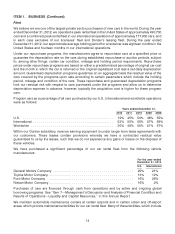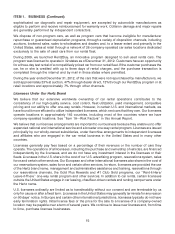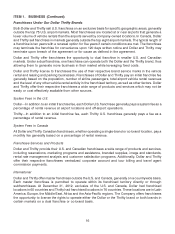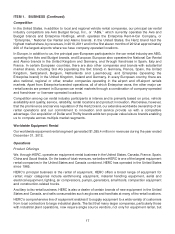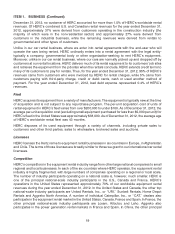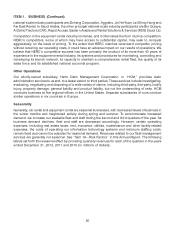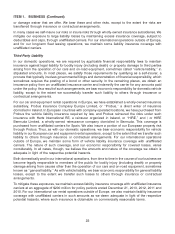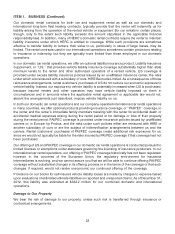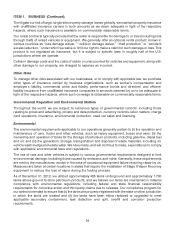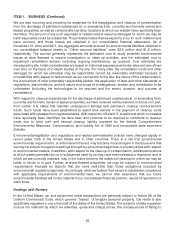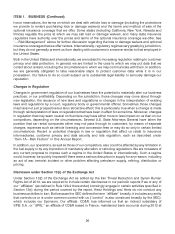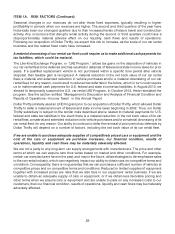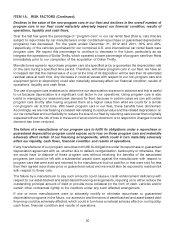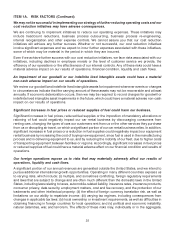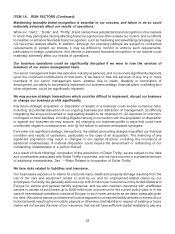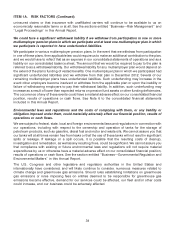Hertz 2012 Annual Report Download - page 48
Download and view the complete annual report
Please find page 48 of the 2012 Hertz annual report below. You can navigate through the pages in the report by either clicking on the pages listed below, or by using the keyword search tool below to find specific information within the annual report.ITEM 1. BUSINESS (Continued)
To mitigate our risk of large, single-site property damage losses globally, we maintain property insurance
with unaffiliated insurance carriers in such amounts as we deem adequate in light of the respective
hazards, where such insurance is available on commercially reasonable terms.
Our rental contracts typically provide that the renter is responsible for damage to or loss (including loss
through theft) of rented vehicles or equipment. We generally offer an optional rental product, known in
various countries as ‘‘loss damage waiver,’’ ‘‘collision damage waiver,’’ ‘‘theft protection’’ or ‘‘accident
excess reduction,’’ under which we waive or limit our right to make a claim for such damage or loss. This
product is not regulated as insurance, but it is subject to specific laws in roughly half of the U.S.
jurisdictions where we operate.
Collision damage costs and the costs of stolen or unaccounted-for vehicles and equipment, along with
other damage to our property, are charged to expense as incurred.
Other Risks
To manage other risks associated with our businesses, or to comply with applicable law, we purchase
other types of insurance carried by business organizations, such as worker’s compensation and
employer’s liability, commercial crime and fidelity, performance bonds and directors’ and officers’
liability insurance from unaffiliated insurance companies in amounts deemed by us to be adequate in
light of the respective hazards, where such coverage is obtainable on commercially reasonable terms.
Governmental Regulation and Environmental Matters
Throughout the world, we are subject to numerous types of governmental controls, including those
relating to prices and advertising, privacy and data protection, currency controls, labor matters, charge
card operations, insurance, environmental protection, used car sales and licensing.
Environmental
The environmental requirements applicable to our operations generally pertain to (i) the operation and
maintenance of cars, trucks and other vehicles, such as heavy equipment, buses and vans; (ii) the
ownership and operation of tanks for the storage of petroleum products, including gasoline, diesel fuel
and oil; and (iii) the generation, storage, transportation and disposal of waste materials, including oil,
vehicle wash sludge and waste water. We have made, and will continue to make, expenditures to comply
with applicable environmental laws and regulations.
The use of cars and other vehicles is subject to various governmental requirements designed to limit
environmental damage, including those caused by emissions and noise. Generally, these requirements
are met by the manufacturer, except in the case of occasional equipment failure requiring repair by us.
Measures are taken at certain locations in states that require the installation of Stage II Vapor Recovery
equipment to reduce the loss of vapor during the fueling process.
As of December 31, 2012, we utilized approximately 485 tanks underground and approximately 1,700
tanks above-ground to store petroleum products, and we believe our tanks are maintained in material
compliance with environmental regulations, including federal and state financial responsibility
requirements for corrective action and third-party claims due to releases. Our compliance program for
our tanks is intended to ensure that (i) the tanks are properly registered with the state or other jurisdiction
in which the tanks are located and (ii) the tanks have been either replaced or upgraded to meet
applicable secondary containment, leak detection and spill, overfill and corrosion protection
requirements.
24


